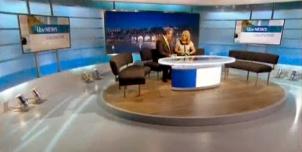Full Freeview on the Belmont (Lincolnshire, England) transmitter
| Google Streetview | Google map | Bing map | Google Earth | 53.335,-0.172 or 53°20'7"N 0°10'20"W | LN8 6JT |
The symbol shows the location of the Belmont (Lincolnshire, England) transmitter which serves 710,000 homes. The bright green areas shown where the signal from this transmitter is strong, dark green areas are poorer signals. Those parts shown in yellow may have interference on the same frequency from other masts.
This transmitter has no current reported problems
The BBC and Digital UK report there are no faults or engineering work on the Belmont (Lincolnshire, England) transmitter._______
Digital television services are broadcast on a multiplexes (or Mux) where many stations occupy a single broadcast frequency, as shown below.
64QAM 8K 3/4 27.1Mb/s DVB-T MPEG2
DTG-12 QSPK 8K 3/4 8.0Mb/s DVB-T MPEG2
H/V: aerial position (horizontal or vertical)
Which Freeview channels does the Belmont transmitter broadcast?
If you have any kind of Freeview fault, follow this Freeview reset procedure first.Digital television services are broadcast on a multiplexes (or Mux) where many stations occupy a single broadcast frequency, as shown below.
64QAM 8K 3/4 27.1Mb/s DVB-T MPEG2
DTG-12 QSPK 8K 3/4 8.0Mb/s DVB-T MPEG2
H/V: aerial position (horizontal or vertical)
Which BBC and ITV regional news can I watch from the Belmont transmitter?

BBC Look North (Hull) 0.7m homes 2.7%
from Hull HU1 3RH, 47km north-northwest (346°)
to BBC East Yorkshire and Lincolnshire region - 4 masts.

ITV Calendar 0.7m homes 2.7%
from Leeds LS3 1JS, 106km west-northwest (299°)
to ITV Yorkshire (Belmont) region - 4 masts.
All of lunch, weekend and 80% evening news is shared with Emley Moor region
How will the Belmont (Lincolnshire, England) transmission frequencies change over time?
| 1965-80s | 1984-97 | 1997-98 | 1998-2011 | 2011-13 | 4 Mar 2020 | ||||
| VHF | A K T | W T | W T | W T | W T | ||||
| C7 | ITVwaves | ||||||||
| C13 | BBCtvwaves | ||||||||
| C22 | BBC1waves | BBC1waves | BBC1waves | BBCA | BBCA | ||||
| C23 | ArqA | ||||||||
| C25 | ITVwaves | ITVwaves | ITVwaves | D3+4 | D3+4 | ||||
| C26 | ArqB | ||||||||
| C27 | LDN | ||||||||
| C28 | BBC2waves | BBC2waves | BBC2waves | BBCB | BBCB | ||||
| C30 | -SDN | SDN | |||||||
| C32 | C4waves | C4waves | C4waves | _local | |||||
| C33 | com7 | ||||||||
| C35 | com8 | ||||||||
| C53tv_off | ArqA | ||||||||
| C55tv_off | com7tv_off | ||||||||
| C56tv_off | C5waves | C5waves | COM8tv_off | ||||||
| C60tv_off | -ArqB |
tv_off Being removed from Freeview (for 5G use) after November 2020 / June 2022 - more
Table shows multiplexes names see this article;
green background for transmission frequencies
Notes: + and - denote 166kHz offset; aerial group are shown as A B C/D E K W T
waves denotes analogue; digital switchover was 3 Aug 11 and 17 Aug 11.
How do the old analogue and currrent digital signal levels compare?
| Analogue 1-4 | 500kW | |
| BBCA, D3+4, BBCB | (-5.2dB) 150kW | |
| ARQA, ARQB | (-7dB) 100kW | |
| Analogue 5, SDN | (-10dB) 50kW | |
| com8 | (-10.9dB) 40.9kW | |
| com7 | (-11.3dB) 37.1kW | |
| Mux 2* | (-14dB) 20kW | |
| Mux 1*, Mux A*, Mux B* | (-17dB) 10kW | |
| LDN | (-20dB) 5kW | |
| Mux C*, Mux D* | (-21dB) 4kW |
Which companies have run the Channel 3 services in the Belmont transmitter area
|
|
Wednesday, 7 September 2011
Des Collier: Good to hear that you have sorted the problems out.
I'm quite sure that homes around The Wash have always used Belmont, as I recall this "title card" being shown on ITV in the 1970s (when I was very small):
http://ukfree.tv/styles/i….png
| link to this comment |
Des Collier: Good to hear that you have sorted the problems out.
I'm quite sure that homes around The Wash have always used Belmont, as I recall this "title card" being shown on ITV in the 1970s (when I was very small):

| link to this comment |
Saturday, 10 September 2011
G
G Havard6:24 PM
Skegness
Graham PE25 3JJ
I live in Skegness Lincs and have recently retuned my TV for the digital channels.
Prior to the change over I received ALL the availble programmes, but now, in spite of inserting a signal booster and re-installing many times, I have lost at least 30%. An apparent anomaly is that I get channel 37 (Price Drop) but not the sister channels.
My set-top box/recorder (Grundig- who have no answer) is recent and up-to-date tech.
Any solutions???
| link to this comment |
G's: mapG's Freeview map terrainG's terrain plot wavesG's frequency data G's Freeview Detailed Coverage
G Havard: First, please get rid of the signal booster, as it will only make matters worse.
Secondly, the "ArqA" multiplex is broadcast at low power levels until 23rd November 2011, at which point they are boosted to full strength and you will get the missing channels.
| link to this comment |
Tuesday, 13 September 2011
M
Mark Fletcher12:28 AM
Halifax
Although in Emley Moor territory,having posted similar comments on their page,i can clearly receive 3 of Belmont's 6 Multiplexes on my Freeview+ non-HD set-top box,surprising really as i reside in a hilly area North of Halifax some 70+ miles away from the Belmont transmitter using a set-top indoor aerial without an amplifier.These Mux's being BBCA on ch 22,D3+4 on ch 25 and SDN on ch 30 all 100% quality and stabilising on 71% strength.Only ArqA on ch 53 and ArqB on ch 60 both currently on very low power due to frequencies clashing with Tacolneston until Wednesday 23 November 2011,and BBCB (HD) on ch 28 (being a non-HD box) are the other 3 Belmont Mux's i am currently unable to receive,although 2 of the above,ArqA (ch 53) and ArqB (ch 60) after the Tacolneston switchover will have both its signal powers increased as the frequencies clash which i mentioned earlier ends on the above date stated,and possibly i may end up receiving both ArqA and ArqB Mux's from Belmont as well.I will reveal all when that time comes !
| link to this comment |
Mark's: mapM's Freeview map terrainM's terrain plot wavesM's frequency data M's Freeview Detailed Coverage
D
Des Collier7:55 PM
Briantist:-Remember that caption well!!!,when i was young,it used to be Anglia up until 1974,i also noticed in norfolk,there are a heck of a lot of relay stations,the further east you go,especially on the coast,the majority of people have 2 aerials,one to belmont,& the other,vertically polarised to the local relay,& people say norfolk's flat & borin'!!!!
| link to this comment |
Des Collier: As I recall, back in the 1970s, most ITV regions scheduled "network" programmes at different times, as there were quite a lot of "regional" programmes.
Many people had multiple aerials so they could have ITV from different regions, so they could catch, their favourite soap, quiz, chat or game show half an hour earlier.
There was a tune to go with the above caption - http://ukfree.tv/styles/i….mp3 .
| link to this comment |
Wednesday, 14 September 2011
J
John Jordan10:36 PM
Sheffield
Des Collier, Briantist: The real joy of having multiple aerials back in the 70s was for films and the Sunday afternoon football. Here in Sheffield, depending in which part of the city you live, you can receive Belmont, Bilsdale, Emley Moor and Waltham. Yorkshire TVs main match on their Sunday highlights show would regularly feature L**ds. But one of the other regions might be showing a 4-4 thriller.
I seem to recall uproar in Lincolnshire back in 1974 when Yorkshire TV was allocated to Belmont replacing Anglia TV. I think it was all to do with the government messing about with boundaries. I know I wasn't pleased.
| link to this comment |
John's: mapJ's Freeview map terrainJ's terrain plot wavesJ's frequency data J's Freeview Detailed Coverage
Thursday, 15 September 2011
M
Mike Dimmick12:46 AM
John Jordan: Allegedly it was because the non-overlap area of Emley Moor for UHF - that is, the area not served by other transmitters - was too small to sustain Yorkshire Television, so either Bilsdale or Belmont would have to be added. Assigning Bilsdale to Yorkshire would have in turn made Tyne Tees too small. So north Yorkshire ends up in Tyne Tees and half of Lincolnshire in 'Yorkshire'.
Part of the problem is that Yorkshire planning was clearly done by the IBA, selecting two of their sites, while Tyne Tees was done by the BBC, selecting their main site at Pontop Pike. As far as I can see, Bilsdale was a new site for UHF and so really, a bit more thought should have been put into siting it! Belmont itself is probably a bit too far north.
BBC regional broadcasting didn't really get going until the early 70s, by which time the UHF network planning had already been done, the new transmitters erected, and the services started up. Before this, the BBC only had 'North'.
| link to this comment |
Select more comments
Your comment please!





